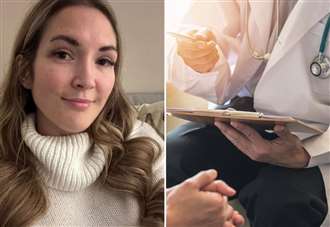A mum-of-three is urging women to attend their cervical screenings amid fears new NHS changes could lead to “missed life-saving appointments”.
Over the past nine years, teaching assistant Abby Squires has received several abnormal results and undergone treatment for pre-cancerous cells found during the examinations, which used to be called a smear test.

Cervical screenings are offered to people with a cervix aged 25 to 64 to check their health and help prevent cervical cancer.
Abby, from Wainscott, has experienced all the realities of such tests, including during a pregnancy, and is urging others not to put off going if invited for a test.
The 37-year-old said: “It was quite a worrying time as I did not know what was going to happen in those months or if I was going to be OK.
“The scary thing is you do not know what is happening inside your body. With other cancers, you can look out for symptoms and growths, but you cannot do that with cervical cancer.
“When I first got the abnormal result, every smear test after that, I was always anxious, waiting for the results.

“There was always the sigh of relief when it was normal, but when it was not, I was worried, but I knew it would be dealt with quickly.
“It can be a scary time waiting those two or so weeks for the results, but it is important to get tested. You just do not know what is going to happen or when.
“It is something you do not want to know, but by not checking, there could be something there that is getting worse.”
During cervical screenings a sample is taken, which is checked for high-risk types of human papillomavirus (HPV) that can cause abnormal changes to the cells of the cervix.
In most cases, the body will get rid of HPV without it causing any issues, but sometimes high-risk types can stay and cause changes to the cells in the cervix.
The cells often go back to normal by themselves, but in some cases, they can become cervical cancer if not treated.
You just do not know what is going to happen or when
Around 13 high-risk types of HPV are known to cause 99.7% of all cervical cancers.
Most people will have a negative result following their cervical screening, meaning they do not need any further tests and will be invited for another in five years.
However, sometimes they will be asked to come back in three months if the results are unclear or inadequate.
In other cases, when HPV is found but there are no abnormal cell changes, they will be invited for a screening in a year.
But, if there are changes, they will be offered a colposcopy and could have a treatment called large loop excision of the transformation zone (LLETZ) to remove the cells using a heated loop of wire.
The teaching assistant at Cliffe Woods Primary School is also using her new platform as Ms GB Essex 2025 to discuss the recent changes to cervical screenings with other women.

Last month, the NHS brought forward changes which saw the interval between examinations for those who tested negative for HPV change from three to five years.
The move was recommended by the UK National Screening Committee and is based on analysis from King’s College London showing five-yearly screening is just as safe as three-yearly, with the same number of cancers found.
In a written statement to Parliament, health minister Ashley Dalton previously said the new change “increases the opportunities to test and recall women and people with a cervix who have HPV”, bringing England in line with Wales and Scotland.
She said testing negative for HPV means the chances of developing cancer within five years are very small, as it can take around 10 years or more from the time HPV is detected to develop cervical cancer.
Chief executive of Cancer Research UK, Michelle Mitchell, said: “We welcome this change to cervical screening in England, which is the result of years of vital research to make screening more effective and has shown it is safe to extend the time between tests.
“Screening, alongside the roll out of the HPV vaccine, which Cancer Research UK scientists helped develop, has seen cervical cancer rates drop by around a quarter since the early 1990s, and we look forward to even more progress.
“If you notice any unusual changes for you, do not wait for a screening invitation – speak to your doctor.”

However, Abby fears that the change could lead to “missed life-saving appointments” along with the proposed introduction of home testing kits.
The Medway mum added: “I have been talking to a lot of women about the changes, and it is difficult enough when you go to the GP or sexual health clinic.
“You might give yourself a normal reading when it is not. You do not always know what you are looking at, but the nurses do.
“The fact that they also want us to go longer between tests, too, I cannot see it being a positive thing. How many lives is that going to take?
“This is my chance to speak up for women like me. Smear tests save lives, and I want more women to know that they are not alone in this.
“I want women to feel empowered to get tested, to know their bodies, and to speak out if they feel uncomfortable with the changes being made to screening programmes.”
Experts have been concerned about falling numbers of women under 50 attending cervical screening, with around a third in England not taking up their invitations.
Abby added: “Please go and get it done before it is too late. They really do save lives.
“The test is not as bad as people think, and it only lasts a couple of minutes, and you can take someone with you if it makes you more comfortable.”
